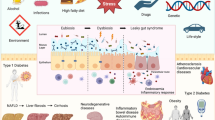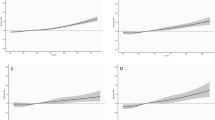Abstract
Bacterial transformation of bile acids is possibly involved in colorectal carcinogenesis. In several epidemiological studies, the secondary bile acid concentration in feces is related to the incidence of colonic cancer. However, data on fecal bile acids in case-control studies are conflicting. We investigated the influence of age, intestinal transit time, and dietary composition on fecal bile acid profiles in healthy subjects of three different age groups (mean ages 22, 48, and 67 years). Fecal bile acids were analyzed by gas-liquid chromatography. The concentration of the major secondary fecal bile acids increased with advancing age and was significantly higher in elderly subjects, compared to young adults. The concentration in middle-aged persons was intermediate. Analysis of dietary constituents showed that the fat intake in the three groups was comparable. The dietary fiber intake in elderly subjects was significantly lower than in the other two groups. The former group did excrete less dry fecal material compared to both other groups. Dietary fiber intake was negatively correlated with the total bile acid concentration. Probably, a decrease in dietary fiber intake results in higher fecal bile acid concentrations with advancing age. From the findings of this study, it is obvious that matching for age is important when case-control studies concerning the role of fecal bile acids in colorectal carcinogenesis are conducted.
Similar content being viewed by others
References
Hill MJ: Bile, bacteria and bowel cancer. Gut 24:871–875, 1983.
Low-Beer TS: Diet and bile acid metabolism. Clin Gastroenterol 6:165–178, 1977
Cummings JH, Wiggins HS, Jenkins DJA, Houston H, Jivraj T, Drasar BS, Hill MJ: Influence of diets high and low in animal fat on bowel habit, gastrointestinal transit time, fecal microflora, bile acid and fat excretion. J Clin Invest 61:953–963, 1978
Hill MJ: The effect of some factors on the faecal concentration of acid steroids, neutral steroids and urobilins. J Pathol 104:239–245, 1971
Reddy BS, Ekelund G, Bohe M, Engle A, Domellof L: Metabolic epidemiology of colon cancer: dietary pattern and fecal sterol concentrations of three populations. Nutr Cancer 5:34–40, 1983
Reddy BS, Weisburger HJ, Wynder EL: Effects of high risk and low risk diets for colon carcinogenesis on fecal microflora and steroids in man. J Nutr 105:878–884, 1975
Cummings JH, Hill MJ, Jenkins DJA, Pearson JR, Wiggins HS: Changes in fecal composition and colonic function due to cereal fiber. Am J Clin Nutr 29:1468–1473, 1976
Aries VC, Crowther JS, Drasar BS, Hill MJ, Ellis RF: The effect of a strict vegetarian diet on the faecal flora and faecal steroid concentrations. J Pathol 103:54–56, 1971
Walters RI, McLean Baird L, Davies PS, Hill MJ, Drasar BS, Southgate DAT, Green J, Morgan B: Effects of two types of dietary fibre on faecal steroid and lipid excretion. Br Med J 2:536, 1975
Cummings JH, Hill MJ, Jivraj T, Houston H, Branch WJ, Jenkins DJA: The effect of meat protein and dietary fiber on colonic function and metabolism I. Changes in bowel habit, bile acid excretion and calcium absorption. Am J Clin Nutr 32:2086–2093, 1979
Kay RM, Truswell AS: Effect of wheat fibre on gastrointestinal function plasma lipids and steroid excretion in man. Br J Nutr 37:227–234, 1977
Stasse-Wolthuis M, Albers HFF, Jeveren JGC van, Jong JW de, Hautvast JGAJ, Hermus RJJ, Katan MB, Brydon WG, Eastwood HA: Influence of dietary fiber from vegetables and fruits, bran or citrus pectin on serum lipids, faecal lipids and colonic function. Am J Clin Nutr 33:1745–1756, 1980
Hill MJ, Drasar BS, Williams REO, Meade TW, Cox AG, Simpson JEP, Morson BC: Faecal bile-acids andClostridia in patients with cancer of the large bowel. Lancet 1:535–539, 1975
Reddy BS, Wynder EL: Metabolic epidemiology of colon cancer. Faecal bile acids and neutral sterols in colon cancer patients and patients with adenomatous polyps. Cancer 39:2533–2539, 1977
Moskovitz M, White C, Barnett RN, Stevens S, Russel E, Vargo D, Flah MH: Diet, fecal bile acids, and neutral sterols in carcinoma of the colon. Dig Dis Sci 24:746–751, 1979
Mudd DG, McKelvey STD, Norwood W, Elmore DT, Roy AD: Faecal bile acid concentrations of patients with carcinoma or increased risk of carcinoma in the large bowel. Gut 21:587–590, 1980
Murray WR, Blackwood A, Trotter JM, Caiman KC, MacKay C: Faecal bile acids andClostridia in the aetiology of colorectal cancer. Br J Cancer 41:923–928, 1980
Kaibara N, Sasaki T, Ikeguchi M, Koga S, Ikawa S: Fecal bile acids and neutral sterols in Japanese with large bowel carcinoma. Oncology 40:255–258, 1983
Tanida N, Hikasa Y, Shimoyama T, Setchell KDR: Comparison of faecal bile acid profiles between patients with adenomatous polyps of the large bowel and healthy subjects in Japan. Gut 25:824–832, 1984
Hikasa Y, Tanida N, Ohno T, Shimoyama T: Faecal bile acid profiles in patients with large bowel cancer in Japan. Gut 25:833–838, 1984
Breuer NF, Domes P, Jaekel S, Goebell H: Fecal bile acid excretion pattern in colonic cancer patients. Dig Dis Sci 30:852–859, 1985
Hinton JM, Lennard Jones JE, Young AC: A new method for studying gut transit time using radiopaque markers. Gut 10:842–847, 1969
Faassen A van, Nagengast FM, Hectors M, Broek WJH van den, Huybregts AWM, Werf SDJ van der, Berge Henegouwen GP van, Tongeren JHM van: Determination of individual human faecal bile acids by gas-liquid chromatography after enzymatic deconjugation and simultaneous solvolysis and methylation using dimethoxypropane. Clin Chim Acta 192:231–239, 1985
Davignon J, Simmonds WJ, Ahrens EH Jr: Usefulness of chromic oxide as an internal standard for balance studies in formula fed-patients and for assessment of colonic function. J Clin Invest 52:127–138, 1968
Hill MJ, Aries VC: Faecal steroid composition and its relationship to cancer of the large bowel. J Pathol 104:129–139, 1971
Reddy BS, Wynder EL: Large-bowel carcinogenesis: fecal constituents of populations with diverse incidence rates of colon cancer. J Natl Cancer Inst 50:1437–1442, 1973
IARC Intestinal Microecology Group: Dietary fibre, transit time, faecal bacteria, steroids and colon cancer in two Scandinavian populations. Lancet 2:207–211, 1977
Reddy BS, Hedges A, Laakso K, Wynder EL: Metabolic epidemiology of large bowel cancer. Fecal bulk and constituents of high-risk North American and low-risk Finnish population. Cancer 42:2832–2838, 1978
Jensen OM, Maclennon R, Wahrendorf J: Diet, bowel function, fecal characteristics and large bowel cancer in Denmark and Finland. Nutr Cancer 4:5–19, 1982
Domellof L, Darby L, Hanson D, Mathews L, Simi B, Reddy BS: Fecal sterols and bacterial β-glucuronidase activity: A preliminary metabolic epidemiology study of healthy volunteers from Umea, Sweden and metropolitan New York. Nutr Cancer 4:120–127, 1982
Werf SDJ van der, Huybregts AHM, Lamers HLM, Berge-Henegouwen GP van, Tongeren JHM van: Age dependent differences in human bile acid metabolism and 7α-dehydroxylation. Eur J Clin Invest 11:425–431, 1981
Dokkum W van, Pikaar NA, Thissen JTNM: Physiological effects of fibre-rich types of bread. 2. Dietary fibre from bread: Digestibility by the intestinal microflora and water holding capacity in the colon of human subjects. Br J Nutr 50:61–74, 1983
Author information
Authors and Affiliations
Rights and permissions
About this article
Cite this article
Nagengast, F.M., Van Der Werf, S.D.J., Lamers, H.L.M. et al. Influence of age, intestinal transit time, and dietary composition on fecal bile acid profiles in healthy subjects. Digest Dis Sci 33, 673–678 (1988). https://doi.org/10.1007/BF01540429
Received:
Revised:
Accepted:
Issue Date:
DOI: https://doi.org/10.1007/BF01540429




